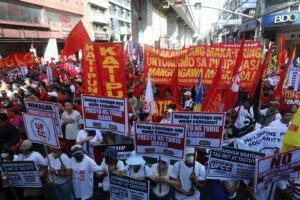By Chloe Mari A. Hufana, Reporter
THE PHILIPPINES’ score in the global Labor Rights Index worsened this year, largely due to an environment that restricts unions, strikes, and collective bargaining deals.
A study by the Amsterdam-based WageIndicator Foundation and the Center for Labor Research showed the Philippines logged a score of 68 out of 100 in the global Labor Rights Index this year, falling 2.5 points from a 70.5 score in 2022.
According to the scale, a score of 60.5 to 70 means there is limited access to decent work.
However, the Philippines’ score was below the global average of 74.
The Labor Rights Index scored economies based on labor laws only, discounting the actual working conditions or labor law compliance in workplaces, the Dutch organization said in a statement.
The biennial report showed that the country maintained its 2022 scores in nine of the 10 indicators in the study, except for Freedom of Association, where it scored zero out of 100.
“The Philippines saw a negative score adjustment in the Freedom of Association Indicator,” it said. It cited the provision in the Labor Code that a trade union “must demonstrate majority support in a bargaining unit for engaging in collective bargaining.”
University of the Philippines-Diliman School of Labor and Industrial Relations Assistant Professor Benjamin B. Velasco said the score on the rights of association and collective bargaining was “not surprising” due to the labor-related killings in the country and the unimplemented recommendations of the International Labor Organization High-Level Mission last year.
“The challenge for [the country] is how to improve its institutions (Department of Labor and Employment, labor inspectors, Philippine Economic Zone Authority, police, and military) so that laws (labor-related or otherwise) are implemented fairly and judiciously. Unfortunately, this is easier said than done,” he added in a Facebook Messenger chat.
The Philippines posted a score of 100 for the Maternity at Work indicator, which is attributed to policies supporting maternity leave, benefits, and job protection for pregnant workers.
Philippine laws mandate at least 14 weeks of paid maternity leave, with cash benefits covering a substantial portion of a worker’s wages.
The Philippines had a score of 80 in four indicators: Fair Wages, Employment Security, Social Security, and Fair Treatment.
For Fair Wages, it cited Philippine laws on minimum wages and overtime compensation but noted the lack of a law requiring additional compensation for working on a weekly rest day.
For Employment Security, it cited laws that require written employment contracts and severance of at least two weeks’ wages for every year of service. However, there is no law that limits the probationary period to three months.
Bukluran ng Manggagawang Pilipino National President Renecio “Luke” S. Espiritu called the scores for Fair Wages and Employment Security as “absurd,” noting that the minimum wage in the country (P7,531) is only a third of the living wage (P21,494).
“We in the labor movement will not stop in our fight to abolish all manpower agencies, a legislated wage increase of P750 plus, and guaranteeing union rights,” he said in a Facebook Messenger chat.
Meanwhile, the country scored 75 in both Safe Work and Child and Forced Labor as there is a lack of law restricting work that is prejudicial to the health of the mother or the child, and the lack of law setting employment entry age equal to or higher than the compulsory schooling age.
The Philippines scored 60 on Decent Working Hours, since it lacks laws restricting maximum working hours, including overtime, to 56 hours per week and requiring at least three working weeks of paid annual leave.
It also scored 50 on Family Responsibilities as there is no law requiring four-month parental leave for parents and flexible working arrangements for workers with family responsibilities.
“Comparing with other [Southeast Asian] countries. [The Philippines scored] higher than average. But this is because the ranking is based on legislation, not implementation,” Mr. Velasco said. “If enforcement is taken into consideration, I believe the Philippines will [score] lower.”
The Labor Rights Index 2024 is a de-jure index covering 145 economies and structured around the working lifespan of a worker.
In total, 46 questions or evaluation criteria are scored across 10 indicators. The overall score is calculated by taking the average of each indicator, with 100 being the highest possible score.
Greece and Hungary are among the top scorers, with 96 points each, while Nigeria is the worst with 37 points.
